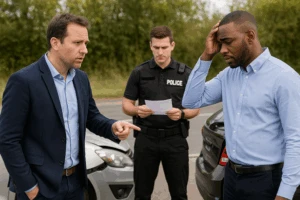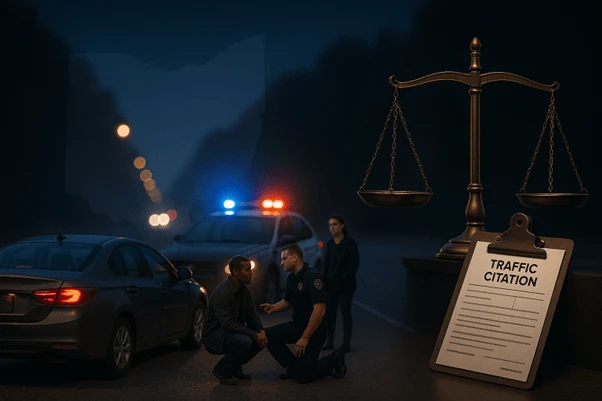
The aftermath of getting into a car accident can already be challenging to navigate, and a citation issued at the scene can further complicate the situation for you. Traffic tickets are records that you’ve driven negligently, and their presence on your driving record could work against you in civil claims.
However, it may be wise to remember that every case is different. Not all tickets affect your claim equally, and having a citation on your record doesn’t automatically close the door to compensation.
If you were recently involved in an accident involving a traffic ticket, we recommend that you reach out to a qualified car accident attorney who can help you understand the legal implications of receiving a ticket and advise you on what steps to take next.

Understanding the Weight of Traffic Citations
Traffic citations are formal notices issued by law enforcement and given to a driver who is found to have violated one or more traffic laws. It’s common for the ticket to be accompanied by a fine, and the price can vary depending on the severity of offense.
Let’s take, for example, the act of speeding, which is one of the most common reasons for receiving a traffic citation. The more miles per hour that you were caught going over the speed limit, the higher your fine will be.
There are more than 200 million licensed drivers in the United States (Statistica). Not every one of those drivers strictly adheres to the law, and even responsible drivers may make a mistake that earns them a demerit. Ohio itself appears to have a considerable number of drivers with a tendency towards speeding.
In 2024, a report by Insurify revealed that Ohio ranked among the top three states where drivers received the most speeding tickets.
Speeding is just one example, but there are numerous reasons that someone might be given a traffic citation, including:
- Running a red light
- Failing to yield
- Improper lane changes or passing
- Texting and driving
- Driving under the influence
- Parking violations
Traffic tickets are more than just an inconvenience or a fee; they’re evidence that you’ve violated the law, and their influence can ripple onwards.
If you have a history of traffic violations and then get into a car accident, insurers and at-fault parties may point towards this to signal your blame for the accident, even if another party was responsible.
How Traffic Tickets Affect Your Insurance
Citations often come with their own costs, but as we’ve mentioned, not all citations are equal in severity, and certain types of tickets can bring additional financial repercussions.
Unlike non-moving violations — e.g. parking tickets, expired tags, etc. — moving violations like speeding can also raise your insurance premium.
According to an analysis done by Forbes, insurance rates increase by an average of 26% for drivers who receive a speeding ticket, and this rate can remain instated for several years afterwards.
Citations Do Not Automatically Determine Your Fault
Blemishes in your driving history can be a strike against you and your case, and they can’t simply be overlooked by the court. Regardless of whether they were issued before the accident or because of the accident, insurance companies may point to these instances of recorded negligent driving in order to strengthen their case. But a citation on your record or a ticket issued due to the accident doesn’t automatically pin you as the party who’s at fault.
Each case has its own unique details and context that are important to weigh into consideration. If you or someone you know recently became the victim of another’s negligence on the roads, contact an experienced car accident lawyer to learn more about the legal avenues available to you.
Ohio’s Comparative Negligence Law
Ohio is one of many states that follows a comparative negligence system, which allows fault to be split amongst several parties in the case of an auto accident (ORC). This means a few things:
- Even if you were found to be partially responsible for the car accident, you may still be able to receive compensation.
- Your compensation will be diminished according to the amount of fault you share. For example, if you were found to be 20% at fault for the accident, then the damages you receive would then be diminished by 20%.
- You will not be able to receive any compensation if you are found to be more than 50% at fault.
If you were involved in an accident, insurers or at-fault drivers can point to the fact that you were violating a traffic law to claim that your own negligence contributed to your injuries, and your potential compensation could therefore be negatively affected.
A knowledgeable car accident attorney can evaluate your case and help you determine what damages you may be entitled to. This may include compensation for both economic and non-economic damages such as:
- Medical expenses related to the accident
- Lost wages and loss of future earning capacity
- Property damage
- Pain and suffering
- Emotional distress
We Will Be
There To Help
You All The Way
What If They issue me a ticket at the scene?
Certain violations such as expired tags would have no bearing on the results of your claim, as they are not relevant to determining fault.
However, even if you receive a ticket for a more relevant violation, not all hope is lost. You don’t have to give up on filing a claim because you were ticketed, but you shouldn’t underestimate its seriousness, either.
Here’s what we recommend you do if you’re ever in a car accident involving a traffic citation:
- Seek medical attention immediately: Your safety is of the utmost priority after an accident. Even if you feel fine, it’s important to visit a doctor and monitor your health. Some injuries don’t make themselves apparent right away, and the longer you wait for treatment, the more seriously your health could be affected.
- Report the accident to the police: Ohio law requires all car accidents to be reported, even if you don’t suspect any criminal or illegal activity. Make sure that both you and the driver remain at the scene until the police arrive, and that you receive either a copy of the report or a report number if that report isn’t ready yet.
- Remain neutral and polite: Be honest with the police but do not admit fault regarding the accident or volunteer any information that might construe you as responsible for the accident.
- Document everything: After an accident, you want to collect as much information as you can. This means taking photos of the scene, any vehicle damage as well as any visible injuries. Additionally, you should always exchange contact and insurance details with any other driver involved in the car accident, and you should try to collect the names and contact information of any witnesses.
Get the Legal Support You Need: Contact The Fitch Law Firm for Your Car Accident Case
If you or someone you know has been injured in an accident involving a traffic citation, it’s important to consult with a knowledgeable car accident attorney.
At The Fitch Law Firm, we can help you understand your legal rights, investigate the circumstances surrounding the accident, and gather crucial evidence that can support your case.
Our team has extensive experience handling car accident cases, and we specialize in helping victims navigate the nuances of Ohio law and receive the compensation they deserve. We recognize the financial and emotional strain that accidents can cause, and we are committed to ensuring that at-fault parties who contributed to your injuries are held accountable.
Contact us today at (614)412-8477 or through our website for a free consultation and take the first step towards securing the justice you deserve.
